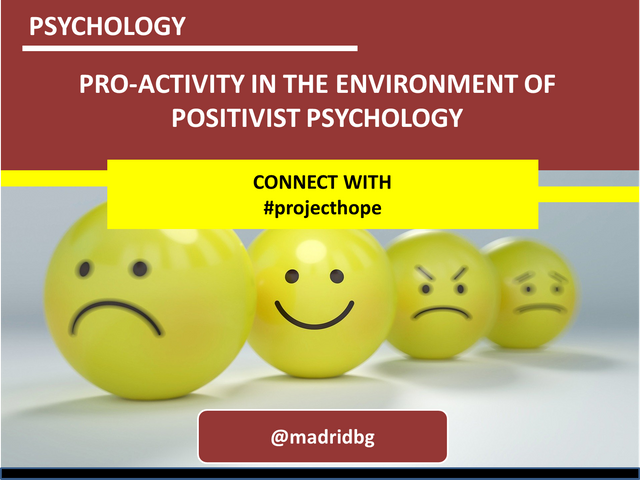
Author: @madridbg, via Power Point 2010, using public domain images. Gino Crescoli
Greetings and welcome dear readers of this prestigious platform, the topic that corresponds to this publication is related to positive thoughts and their management from psychology.
In this sense, on a daily basis we can be exposed to constant words of encouragement or optimistic messages that we can find in the different social networks where we live, many oriented with the intention of selling products or simply to grow the blog or the number of followers in the space where encouraging content is shared and socialized in psychological terms.
In such a way, the bombardment of this information that for many comes from experts has grown so widely that we must feel saturated by hearing the same thing repeatedly, to the point that these positivist actions are perceived as skepticism and useless in daily life.

Fig. 2. Intentionality is the key to positivism. Author: Jill Wellington
Based on the above, it is appropriate to ask ourselves, what are the theoretical foundations that support a positivist psychology? To answer this question, it is necessary to highlight that this type of positive behavior professed by positivists is perceived on a psychological level as a certified current that is responsible for studying the psychological behavior of human strength.
In general, this positivist psychology focuses on the study and approach to traumatic situations of patients, resilience and the ability to face negative scenarios.
To achieve the above, positivist psychology developed 4 proposals that guarantee the happiness and well-being of humanity through concrete actions focused on determination, among these are:
1. Be grateful above all, for this we can write a diary where we give thanks for all the good and not so good things that happen in our lives, in the same way we can use other strategies such as letter of gratitude, which consists of writing a letter where the things for which we are grateful to another person are manifested, we must read it to them. Remember that happiness is being good with our fellow man and for this we must be intentional.

Fig. 3. Being grateful represents the key to happiness. Author: Alexas
2. Exercise our body, to achieve this goal we must establish weekly exercise routines in order to eliminate the stress caused by excessive daily work.
3. Be aware of bad experiences, for this it would be good to write down those negative experiences, analyze them and find a way to correct them or not to repeat them, remember if we know our limitations we can learn from are.
4. Regular rest, our body must have a restoration time that allows us to recharge energy and think clearly.
As we can see throughout the writing, intentionality is essential if we want to be positive, which is an approach that allows us to achieve happiness and live in harmony with our environment.
BIBLIOGRAPHY CONSULTED

[1] Lupano y Col. POSITIVE PSYCHOLOGY: ANALYSIS SINCE ITS EMERGENCE Artículo: Acceso Online
OF INTEREST

•

Grateful with the community @project.hope and with all the management team of the same one that they motivate us to continue working in a mutual and balanced growth.


Greetings friend @madridbg, a very interesting topic, mainly people who live under a lot of stress, you tend to improve their performance and not to be active people in a positive way, they are psychologically dominated by the stress of the moment and that leads them to lose the way to think accurately, thanks for sharing this topic.
Downvoting a post can decrease pending rewards and make it less visible. Common reasons:
Submit
positivist psychology is important as it gives us the keys on how to live and maintain a positive life and mindset.
Downvoting a post can decrease pending rewards and make it less visible. Common reasons:
Submit